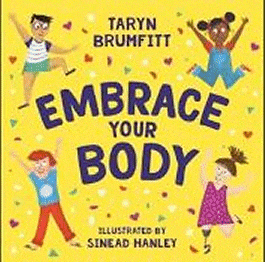
Embrace Your Body
Embrace Your Body
Taryn Brumfitt
Sinead Hanley
Puffin, 2020
24pp., hbk., RRP $A24.99
9781760895983
There is something scary in the statistic that 70% of primary school children have a concern about their body image, and when this is coupled with the greatest desire of post-restriction Australia is for beauty salons and gyms to re-open, it is easy to see why and that without intervention, this obsession with how we look is not going to change. From long before the voluptuous Marilyn Monroe to waif-like Twiggy to the more-rounded Kardashians, our obsession with how our bodies look rather than how they perform has dominated so many lives, and this is as true for our males as it is for females. How many young lads see themselves in the image of a Hemsworth?
In 2016 Taryn Brumfitt wrote and directed a documentary Embrace which encouraged us to love who we are as we are, but that doco received a MA15+ classification and so did not reach down to the roots of where the obsession starts.
So now she is addressing this with the establishment of a number of initiatives that speak directly to our children including another documentary , a song and, based on that song, this book. Based on the mantra that “your body is not an ornament:it is the vehicle to your dreams!”. children of every size, shape, colour and ability are engaged in all sorts of activities showing the extraordinary things our bodies can do proving that nobody has a body that is the same as anyone else’s and that it is capable of so much more than conforming to some arbitrary stereotyped look.
This book has an important role in the conversations and investigations we have with our youngest students and not just in the health and mindfulness programs we offer. Because we are all individuals it opens up the world of science and maths as we investigate why and how that is, delving into genetics and measurement and a host of other areas that give a deep understanding to the message of the book, including the language we use to describe others. ‘Smart’, ‘clever’, ‘athletic’ are so much better than the pejorative terms of ‘pretty’, ‘handsome’ and ‘strong’. For if, from an early age, we can grasp that we, as individuals, are a combination of the unique circumstances of both our nature and nurture, then our understanding of and appreciation for who we are is a big step towards valuing the inside regardless of the outside in both ourselves and others.
It is sad that there is still a need for this sort of book in 2020, just as there was in 1920 and 1960, but if you make and use just one purchase this year, this could be the one that changes lives for the better.
